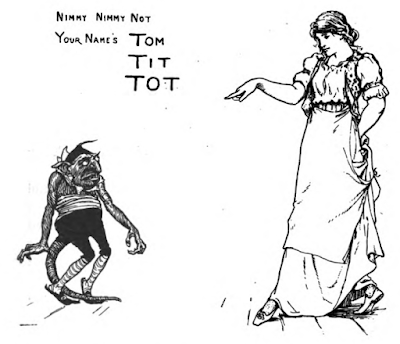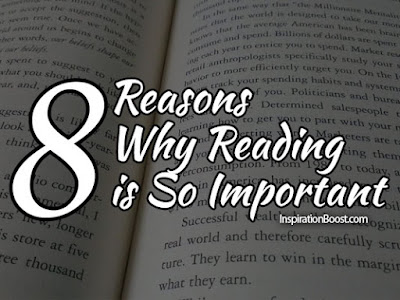Reading Notes: English Fairy Tales, Reading A
I really liked reading the fascinating English fairy tales. I think they are unique in that all of them consisted of rich plots and characters. The stories were all fascinating in their own respect, but one story that particularly caught my attention was the story of "Tom Tit Tot". I particularly liked this one because it was really mysterious and brought a lot of suspense while I was reading.
The story starts with a woman baking five pies for supper. But the pies were over-baked and the crusts of the pies were hard as rock. So the woman told her daughter to have them rest to make them soft. The impatient and hungry daughter ate them all however.
I particularly found it interesting to see how the daughter pretends as if she doesn't know anything about missing pies: "The girl went and she looked, and there was nothing but the dishes. So back she came and says she: 'Noo, they ain't come again.'" She ate them all, so there were none!
I like how the king sounded so gentle and polished: 'What was that you were singing, my good woman?' It sounded as if he was a refined gentleman although he was the king of the story. In addition, he spoken with 'modern' English, so I thought that's how distinguished himself from the average people like the woman and daughter.
The king obviously was impressed by the daughter's bizarre (at least to me) singing and asked her to marry him. It sounded like a somewhat suspicious and mysterious plan of the king that she was allowed to do anything, yet restrain herself for the last month: 'eleven months out of the year she shall have all she likes to eat, and all the gowns she likes to get, and all the company she likes to keep; but the last month of the year she'll have to spin five skeins every day, and if she don't I shall kill her.'
What was the reason for this last month suggestion? The king's proposal made me ponder. Like all people, including myself, people are forgetful like this daughter: "But not one word did he say about 'em, and she thought he'd wholly forgotten 'em."
I don't understand this king's intention. The daughter was his wife, yet he challenged her so harshly: "Now, my dear, here you'll be shut in tomorrow with some victuals and some flax, and if you haven't spun five skeins by the night, your head'll go off.'"
I like how the daughter tried to reward the black thing when it was trying to help her out: "'What's your pay?' says she."
I also like how their interesting conversation played out. She was guessing the name of the black little thing: Now, what's my name?' says he.
'What, is that Bill?' says she.
'Noo, that ain't,' says he, and he twirled his tail. 'Is that Ned?' says she.
'Noo, that ain't,' says he, and he twirled his tail. 'Well, is that Mark?' says she.
'Noo, that ain't,' says he, and he twirled his tail harder, and away he flew."
Obviously, she was clueless about the thing's name. I guess she kind of knew that at least it was male.
The poor daughter was faced with two challenges, one from her mean husband and the mysterious black thing: 'Woman, there's only tomorrow night, and then you'll be mine!' This really is scary.
The black little thing's identity was finally discovered by the king: "what should there be but the funniest little black thing you ever set eyes on. And what was that doing, but that had a little spinning-wheel, and that was spinning wonderful fast, and twirling that's tail."
Black little thing was disappeared when the daughter told her name. I think this story is trying to tell readers that someone shouldn't be cunning and arrogant like the black little thing. Another wisdom might be that someone has to be perseverent. Although the king challenged the daughter, he eventually ended up helping her from the threat of black little thing.
Bibliography:
English Fairy Tales by Joseph Jacobs with illustrations by John D. Batten (1890).
The story starts with a woman baking five pies for supper. But the pies were over-baked and the crusts of the pies were hard as rock. So the woman told her daughter to have them rest to make them soft. The impatient and hungry daughter ate them all however.
I particularly found it interesting to see how the daughter pretends as if she doesn't know anything about missing pies: "The girl went and she looked, and there was nothing but the dishes. So back she came and says she: 'Noo, they ain't come again.'" She ate them all, so there were none!
I like how the king sounded so gentle and polished: 'What was that you were singing, my good woman?' It sounded as if he was a refined gentleman although he was the king of the story. In addition, he spoken with 'modern' English, so I thought that's how distinguished himself from the average people like the woman and daughter.
The king obviously was impressed by the daughter's bizarre (at least to me) singing and asked her to marry him. It sounded like a somewhat suspicious and mysterious plan of the king that she was allowed to do anything, yet restrain herself for the last month: 'eleven months out of the year she shall have all she likes to eat, and all the gowns she likes to get, and all the company she likes to keep; but the last month of the year she'll have to spin five skeins every day, and if she don't I shall kill her.'
What was the reason for this last month suggestion? The king's proposal made me ponder. Like all people, including myself, people are forgetful like this daughter: "But not one word did he say about 'em, and she thought he'd wholly forgotten 'em."
I don't understand this king's intention. The daughter was his wife, yet he challenged her so harshly: "Now, my dear, here you'll be shut in tomorrow with some victuals and some flax, and if you haven't spun five skeins by the night, your head'll go off.'"
I like how the daughter tried to reward the black thing when it was trying to help her out: "'What's your pay?' says she."
I also like how their interesting conversation played out. She was guessing the name of the black little thing: Now, what's my name?' says he.
'What, is that Bill?' says she.
'Noo, that ain't,' says he, and he twirled his tail. 'Is that Ned?' says she.
'Noo, that ain't,' says he, and he twirled his tail. 'Well, is that Mark?' says she.
'Noo, that ain't,' says he, and he twirled his tail harder, and away he flew."
Obviously, she was clueless about the thing's name. I guess she kind of knew that at least it was male.
The poor daughter was faced with two challenges, one from her mean husband and the mysterious black thing: 'Woman, there's only tomorrow night, and then you'll be mine!' This really is scary.
The black little thing's identity was finally discovered by the king: "what should there be but the funniest little black thing you ever set eyes on. And what was that doing, but that had a little spinning-wheel, and that was spinning wonderful fast, and twirling that's tail."
Black little thing was disappeared when the daughter told her name. I think this story is trying to tell readers that someone shouldn't be cunning and arrogant like the black little thing. Another wisdom might be that someone has to be perseverent. Although the king challenged the daughter, he eventually ended up helping her from the threat of black little thing.
Black Little Thing and the Daughter. Source: Black Little Thing is trying to fool the daughter
Bibliography:
English Fairy Tales by Joseph Jacobs with illustrations by John D. Batten (1890).




Comments
Post a Comment